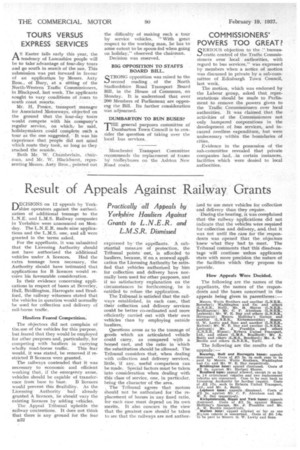Result of Appeals Against Raihvay . Grants
Page 50

If you've noticed an error in this article please click here to report it so we can fix it.
Practically all Appeals by Yorkshire Hauliers Against Grants to L .N.E .R . and L.M.S.R. Dismissed
DECISIONS on 12 appeals by YorkL./shire operators against the authorization of additional tonnage to the L.N.E. and L.M.S. Railway companies in Yorkshire were announced on Monday. The L.N.E.R. made nine applications and the L.M.S. one, and all were 0-ranted in the terms asked.
For the appellants, it was submitted that the Licensing Authority should not have authorized the additional vehicles under A licences. Had the extra tonnage been necessary, the Authority should have intimated that applications for B licences would receive his favourable consideration.
In their evidence concerning applications in respect of bases at Beverley, Hull, Bridlington, Harrogate and Bradford, the railway witnesses stated that the vehicles in question would normally be used for collection and delivery of rail-borne traffic.
Hauliers Feared Competition.
The objectors did not complain of the use of the vehicles for this purpose, but feared that they would be employed for other purposes and, particularly, for competing with hauliers in carrying wholly road-borne traffic, This fear would, it was stated, be removed if re stricted B licences were granted. .
The railways contended that it was necessary to economic and efficient working that, if the emergency arose, vehicles should be capable of transfer
once from base to base. B licences would prevent this flexibility. As the -Licensing Authority had already granted A licence:3, he should vary the existing licences by adding vehicles.
The Appeal Tribunal upholds the railway contentions. It does not think that there is any ground for the fear B.S2
expressed by . the appellants. A substantial measure of protection, the Tribunal points out, is afforded to hauliers, because, if on.a renewal application the Licensing Authority be satisfied that .yehicles authorized by him for collection and delivery have normally been used fo-r other purposes, and if no satisfactory explanation on the circumstances he forthcoming, he is entitled to refuse the application.
The Tribunal is satisfied that the railways established, in each case, that their criliection and delivery services could be better co-ordinated and more efficiently carried out with 'their own vehicles than by employing outside hauliers.
Questions arose as to the tonnage of goods which an articulated vehicle could carry, as compared with a horsed Cart, and the ratio in which the substitution should he allowed. The Tribunal considers that, When dealing with collection and delivery services, little, if any, useful comparison can be made, Special factors must be taken into consideration when dealing with this class of service, one, in particular, being the character of the area , The Tribunal agrees that motors should not be authorized for the replacement of horses in any fixed ratio, for each case must depend On its own merits. It also concurs in the view that the greatest care should be taken to see that the railways are not author
ized to Use more vehicles for collection and delivery than they require.
During the hearing,. it Was complained that the railway • applications did not indicate that the vehicles were required for collection and. delivery, and, that it was not until the case for the respondents was opened that the objectors knew what they had to meet. The Tribunal comments that -this disadvantage will continue unless applicants state with more precision the nature of the facilities which they propose to provide.




















































































